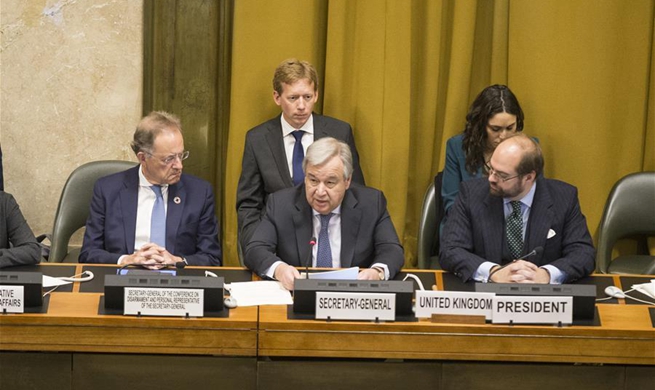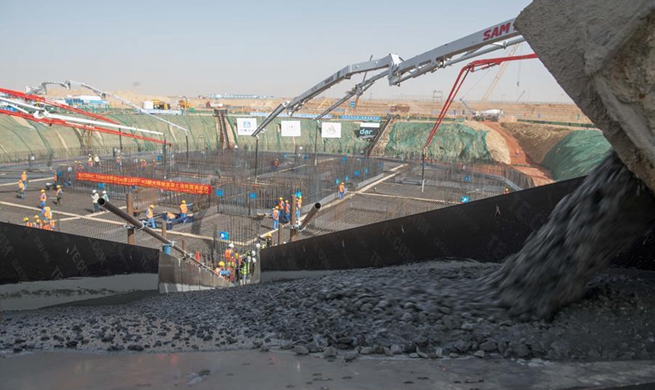by Xinhua writer Xiong Maoling
WASHINGTON, Feb. 25 (Xinhua) -- Craig Allen, president of United States-China Business Council (USCBC), said he believes "good progress" has been made in U.S.-China trade talks and an agreement between the two countries is "within reach."
Allen, who came into office in July last year, urged the two teams to overcome difficulties and reach an agreement "as soon as possible," so as to rebuild confidence in the business community.
During the just-concluded latest round of high-level economic and trade talks, China and the United States have achieved substantial progress on such specific issues as technology transfer, protection of intellectual property rights, non-tariff barriers, service industry, agriculture and exchange rates, the Chinese delegation said Sunday.
Allen said he was happy to learn that the two sides are "putting a pen to a piece of paper and trying to come out with a single understanding." Despite "real difficulties" in certain areas, he remained "very positive" about the two sides reaching a deal.
Allen said he hopes that leaders of the two countries are able to reach an agreement "that is beneficial for both the Chinese people and the American people," and that "better reflect" norms of multilateral organizations such as the World Trade Organization (WTO).
"I think that the Chinese leadership is very wise, and that they realize that market-oriented competition will lead to greater growth," said Allen, who served as Commercial Attache at the U.S. Embassy in Beijing in the 1990s and later as the Deputy Assistant Secretary for China at the U.S. Commerce Department's International Trade Administration.
Allen said that one way to spur that growth is to allow foreign companies to "play a stronger role" in China, adding this is an opportunity for China to embrace a new round of reform and opening-up.
"Over the short term, there are costs for individual interest groups, but the disruption long-term will be very positive," he said.
The USCBC president reaffirmed his opposition to the tariffs added in the trade dispute over the past months. "I would say that really the entire business community would be nervous and not supportive of the use of tariffs," he said.
In the midst of the U.S.-China trade tension, "every unhappy company is unhappy in their own way," Allen said. For U.S. companies who manufacture in China but do not have to trade, the impact is smaller. For companies that do a lot of trading between the two countries, the losses are larger, and they are trying to adjust supply chains.
"Big companies can adjust their supply chains. For smaller companies, sometimes it's really impossible, especially if there's only one supplier of a particular product in the world," he added.
U.S. businesses paid an additional 2.7 billion U.S. dollars in tariffs in November 2018, according to the latest government data released following the partial shutdown, anti-tariff campaign Tariffs Hurt the Heartland said earlier this month. The data also showed a 37-percent decline in exports of U.S. products facing retaliatory tariffs in the same month.
"What we want to do is to remove tariffs, which cause real harm to real people, a lot of real people, and resolve the issues that have been outstanding for a long time," Allen said. "I think good progress has been made. So let's get to yes, as soon as possible."
Refuting the argument of absolute "decoupling" of U.S. and Chinese economies, Allen said he has to "laugh very loudly because it's quite impossible," adding that the two economies are interdependent.
Allen said it is important to talk about the "reasonable space" when discussing decoupling. "I think that both China and America have legitimate national security concerns of course. But the challenge in both countries is to bring that to a manageable size," he said.
Noting that the Chinese economy is generally doing "pretty well," and the prospects for good growth in the next five or 10 years are still strong, Allen said the U.S. business community "remains very interested in being fully engaged" with China and expanding exports and investments to China, as well as welcoming Chinese investments to the United States.
As the world's largest economy and the world's second largest economy, the United States and China have a special responsibility to "cooperate wherever possible" and "compete smartly" when necessary, respectfully "within international norms," Allen said.
On common problems such as global warming, pandemic disease, terrorism and pollution, the two countries should maximize their opportunities to collaborate, he said.
"When we compete, to compete with rules and with buffers and with guidelines so that we don't come into conflict," Allen said. "If the international rules are not good enough, then we should talk about that and adjust them so that they are good enough."
"Right now we are at an inflection point and it could go in any direction," said Allen, referring to U.S.-China economic relations.
"If we are wise, we will both grow stronger and wealthier and more prosperous and more stable together. If we are unwise, we will both grow poorer and less secure over time. I hope we are wise," he said.













